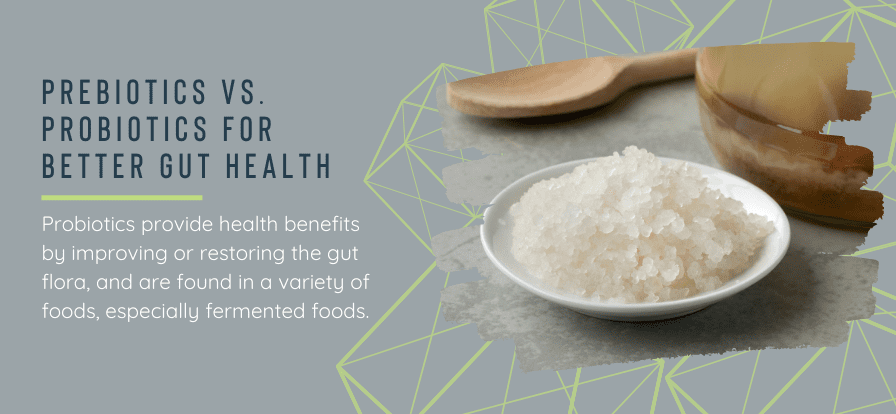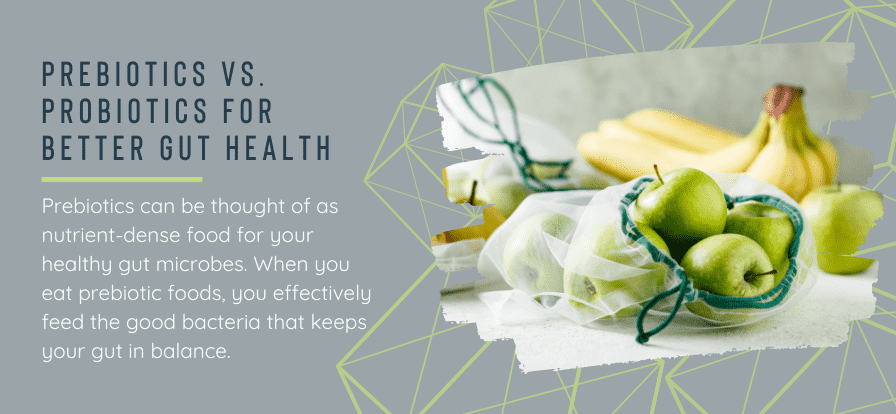Prebiotics vs. Probiotics for Better Gut Health
Written by Martin Ebner, head PT and sports nutrition specialist at Ebylife
Healthy Gut
"Say, what a healthy gut microbiome you have," said no one ever! As important as our digestive tract's wellbeing is, discussing our gut flora is unlikely something you ever discuss with your friends or family. But it is important!
It turns out that the gut feelings we get are real and are part of the "Gut-Brain Axis." In an article titled The Simplified Guide to the Gut-Brain Axis, the authors discuss the connection between our brains and guts. It's interesting stuff, to be sure, but what's it got to do with gut health? Well, the authors point out that our gastrointestinal systems have 1014 microorganisms in our guts. That's a ten followed by fourteen zeros and is ten times more than the total number of cells in the human body.
Unhealthy Gut
An imbalance in gut bacteria, where healthy bacteria are either low in number or outnumbered by bad bacteria, is called "dysbiosis." This word may sound ominous, perhaps rightly so, because certain types of bacteria in your intestines can also contribute to disease. Interestingly, the food that you eat greatly affects the types of bacteria that live inside you.
What Are Probiotics?
Probiotics are the "good bacteria" that make up your gut microbiota. They provide health benefits by improving or restoring the gut flora. Probiotics can be ingested from the food we eat or in supplement form. The most common probiotics are lactobacillus and bifidobacterium. They are found in a variety of foods, especially fermented foods.
What Are Prebiotics?
They are mainly fiber or complex carbs that can’t be digested by human cells. Instead, certain species of bacteria break them down and use them for fuel. Think of them as nutrient-dense food for your healthy gut microbes. When you eat prebiotic foods, you effectively feed the good bacteria that keep your gut in balance. Prebiotic foods contain compounds, such as fructooligosaccharides, inulin, and galactooligosaccharides, which are types of soluble dietary fiber. You can also get targeted prebiotics in supplement form.
Prebiotics or Probiotics? Yes!
So how can you increase your healthy bacteria? One way is to eat a wide variety of foods.
Some high-fiber foods that are good for your gut bacteria include:
Fresh fruits, especially apples, pears, oranges, blueberries, raspberries, blackberries and strawberries
Dried fruits, such as prunes and raisins
Vegetables, especially artichokes, broccoli, green peas, winter squash, and sweet potatoes
Legumes, such as chickpeas, lentils, and peas
Bran (oat and wheat)
Beans (kidney, pinto and white)
Whole grains, such as barley, quinoa, bulgur and brown rice
Foods made with whole grains, such as whole-grain bread, whole-grain cereal and whole-grain pasta
Nuts, especially almonds and pistachios
Seeds
Probiotics from Fermented Foods
Fermented foods contain an important probiotic, lactobacillus. Fermented foods are foods altered by microbes. The process of fermenting usually involves bacteria or yeasts converting the sugars in food to organic acids or alcohol. Fermentation makes the foods you eat more digestible. It makes nutrients more bioavailable by producing enzymes to make them easier to absorb, digest, and utilize. Examples of fermented foods include:
Yogurt
Kimchi
Sauerkraut
Kefir
Kombucha
Tempeh
Miso
According to an article on Healthline.com, 10 Ways to Improve Your Gut Bacteria, Based on Science, many of these foods are rich in lactobacillus bacteria. Eating yogurt appears to be of especially great benefit. People who regularly eat yogurt generally have more lactobacilli in their intestines and have fewer enterobacteriaceae, a bacteria associated with inflammation and a number of chronic diseases.
Pass the Fermented Beets, Please!
Making your own fermented veggies is rather easy and safe. Fermented vegetables are no more than grated, sliced, chopped or whole vegetables placed in a brine of salt and water for a period of time at room temperature to let the beneficial bacteria develop. Almost any vegetable can be fermented. Cauliflower, carrots, zucchini, beets, celery, cucumbers, eggplant, green tomatoes all make excellent ferments. Sauerkraut is simply fermented cabbage, after all!
By fermenting your own veggies, you will save money and increase your menu choices. Fermenting your favorite veggies with your favorite seasonings will help you from getting bored (sauerkraut again?) and will help keep you motivated to include them in your diet. Check out this handy website: Boost your gut health and save money: how to ferment your own foods! Recipes such as Ginger-Lime Carrot Ferment with step-by-step instructions will get you started.
Ferment one vegetable alone, or create a mix, adding suitable herbs and spices like peppercorns, cumin seeds, caraway seeds, fennel seeds, bay leaves, etc. The only types of vegetables that fermentation is not recommended for are those with lots of chlorophyll, like kale or spinach.
Foods Rich in Prebiotics
As I mentioned earlier, prebiotics are things that our bodies don't use directly, but are eaten by the probiotics. Foods rich in prebiotic fiber include:
Apples
Artichokes
Jerusalem artichokes
Asparagus
Garlic
Bananas
Barley
Berries
Cocoa
Chicory
Leeks
Oats
Onions
Soybeans
Whole Grains
The benefits of eating whole grains were touched on earlier, but they're important enough to warrant their own section. Whole grains contain lots of fiber and non-digestible carbohydrates, such as beta-glucan. However, we don’t have the enzymes needed to break them down. When we eat a piece of whole wheat bread or a bowl of popcorn, the fiber passes intact through to the large intestine where it’s fermented by the gut microbiota.
This fermentation produces the short-chain fatty acids (SCFAs) butyrate, propionate, and acetate. These SCFAs are beneficial for gut health because they provide our intestinal cells with a source of energy and are linked to maintaining the integrity of the gastrointestinal tract, which is important for keeping foreign invaders, like bad bacteria, from causing infections or inflammation. Eating whole grains can promote the growth of Bifidobacteria and lactobacillus, as mentioned earlier, as well as Bacteroidetes which expel toxic substances, and influence the immune system to help it control competing pathogens.
Peel Me a Grape and Pass the Dark Chocolate!
As if you needed another reason to eat dark chocolate, polyphenols are the most abundant antioxidant in the human body and increase the growth of beneficial bacteria. They are plant compounds that have many health benefits, including reductions in blood pressure, inflammation, cholesterol levels, and oxidative stress. Polyphenols are "phytochemicals" that are produced by plants to protect themselves from fungi, bacteria, and plant virus infections. Most polyphenols can’t be digested by humans, so they arrive in the colon intact, where they are digested by gut bacteria.
Good sources of polyphenols include:
Cocoa and dark chocolate
Red wine
Grapes
Green tea
Almonds
Onions
Blueberries
Broccoli
Apples
Citrus fruits
Red fruits
Chili peppers
Oats
Plant-Based Diet
You DO NOT need to swear off meat and dairy entirely. However, a Healthline.com article, A 16-Week Vegan Diet Can Do Wonders for Your Gut Microbiome, states that research shows that following a vegan diet for about 4 months can boost your gut microbiome. In turn, that can lead to improvements in body weight and blood sugar management. However, since diets containing animal-based foods promote the growth of different types of intestinal bacteria than plant-based diets do, moving toward a more plant-based diet is probably the healthiest choice.
Multiple studies show the benefits of a plant-based diet. Plants provide the bulk of antioxidant, phytonutrient, and fiber-rich foods. These, as we've been talking about above, are key ingredients in promoting a healthy gut. Also, when we move towards a more plant-based diet, we tend to eat a wider variety of foods, which, as we also mentioned earlier, supports a wider variety of gut flora. In fact, if you review all the suggested foods in the sections above, you'll notice that most are all plant-based.
Other Ways to Improve Gut Health
Some other ways to improve one's gut health are to:
Avoid high-fat, processed, and fried foods
Cut back on artificial sweeteners
Eat smaller, more frequent meals throughout the day
Reduce your stress levels
Maintain a healthy weight
Exercise by engaging in at least 30 minutes of daily physical activity
Avoid tobacco
Take a prebiotic supplement
Performance Lab Prebiotic Supplement
Performance Lab Prebiotic is a fantastic 2-in-1 prebiotic and soluble fiber supplement that supports healthy metabolic and microbiome performance. It has been shown to nourish your existing probiotic colony with Orafti® Synergy1 (Inulin-FOS from chicory root) for robust growth and health. As a result, prebiotic delivers more reliable, natural, and comfortable microbiome support. Its fiber supports digestion, immune function, fat loss, and more. It comes in vegan capsules made from pullulan, a prebiotic fiber made from cultured tapioca. Even the capsule itself will promote a healthy gut microbiome!
Note: Probiotic supplements on the other hand, can be unpredictable. They may overload the gut with 20+ billion mixed cultures and lead to gastric distress. Probiotics are also fragile and may be dead on arrival, failing to help your microbiome.




